|
Music Reviews
Alternative
Blues
Books
Christmas
Classic Rock
Country
Jazz
Lounge
Oldies
Power Pop
Punk & New Wave
Reggae
Rhythm & Blues
Seventies
Texas
Special Features
Randy's Rodeo
Sex Pistols
Motown
Halloween
Valentine's Day
Information
About Me
Feedback
Links
User's Guide
Support Me
Amazon
iTunes
Sheet Music Plus
|
Sock it to me, Santa! Visit my other website, www.hipchristmas.com Visit my other website, www.hipchristmas.com
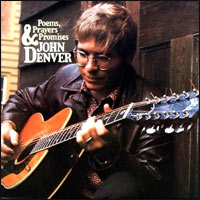 The
sentimental music of the 1970's has fallen so far out-of-vogue that it bears
reminding readers how widely popular John
Denver was during that musically transitional decade. Following the tumult
of the 1960's - when the likes of the Beatles, the Rolling Stones, and Jimi
Hendrix transformed rock from the music of teenage rebellion into the soundtrack
of cultural revolution - artists like Bread and
the Carpenters were welcomed as soft-and-gentle
respite from the noisy maelstrom rock had become. Consequently, John Denver's
back-to-basics folk/pop was just what the denizens of the "Me Decade" yearned
for as they cooled their jets, waiting for the disco and punk that would soon
redouble the pace of change in pop culture. The
sentimental music of the 1970's has fallen so far out-of-vogue that it bears
reminding readers how widely popular John
Denver was during that musically transitional decade. Following the tumult
of the 1960's - when the likes of the Beatles, the Rolling Stones, and Jimi
Hendrix transformed rock from the music of teenage rebellion into the soundtrack
of cultural revolution - artists like Bread and
the Carpenters were welcomed as soft-and-gentle
respite from the noisy maelstrom rock had become. Consequently, John Denver's
back-to-basics folk/pop was just what the denizens of the "Me Decade" yearned
for as they cooled their jets, waiting for the disco and punk that would soon
redouble the pace of change in pop culture.
Now, that's not the whole story. The roots of disco and punk reach as far
back as the late 60's (Sly Stone and the MC5). And, the early 70's were witness
to the heyday of heavy metal (acts like Led Zeppelin, Black
Sabbath, Grand
Funk, and Deep Purple) and the flowering of power
pop (Big
Star, Raspberries),
not to mention considerable reverberations from bubblegum (silly songs like "Billy,
Don't Be A Hero" and "The Night Chicago Died").
But, it was soft-rocking, navel-gazing singer/songwriters like James Taylor,
Carole King, Jackson Browne, and Joni Mitchell
who came to embody the early 70's. Their success - based in no small part on
the archetypes like Bob Dylan and Joan Baez - spawned a host of humbler, lesser
lights: Jim
Croce, Gordon
Lightfoot, America, Janis Ian, Harry
Chapin, Don McLean, and the list goes
on. In many ways, John Denver was no more than the right man in the right place,
hawking tuneful, uplifting songs nearly devoid of guile. The market was fully
primed, and we bought it by the truckload. Before long, Denver was starring
in TV specials, rubbing noses with Frank Sinatra, and making movies with George
Burns.
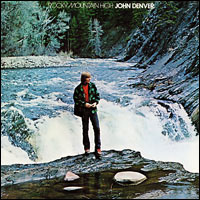 My
formulation, however, makes Denver sound like a careerist and a cynic. I suspect
quite the opposite was true. Listening to his music and reading about his life
- hell, even gazing at his cute-as-a-button photographs - lends me the strong
impression that John Denver meant every word he warbled, and that his frothy
folk sprung from the very depths of his soul. And that, more than any cultural
zeitgeist, explains why he sold more records than almost anyone during a decade
that prized self-expression over artistic achievement. My
formulation, however, makes Denver sound like a careerist and a cynic. I suspect
quite the opposite was true. Listening to his music and reading about his life
- hell, even gazing at his cute-as-a-button photographs - lends me the strong
impression that John Denver meant every word he warbled, and that his frothy
folk sprung from the very depths of his soul. And that, more than any cultural
zeitgeist, explains why he sold more records than almost anyone during a decade
that prized self-expression over artistic achievement.
Which is not to say that John Denver's music is without merit. It is, though
I recommend digesting it in small doses. He recorded roughly 30 albums in almost
as many years, and only a few of those albums merit consideration for individual
purchase. Mainly, these are the ones he recorded during the peak of his popularity
from 1971-1975 - especially Poems,
Prayers, and Promises (1971), Rocky
Mountain High (1972), and Back
Home Again (1974). Most consumers, however, will be best served by Denver's
monster-selling Greatest
Hits (1973) - remastered with bonus tracks in 2005 - or later, more expansive
packages like Definitive
All-Time Greatest Hits (2004).
For many, though, Denver's music warrants a larger
investment, and the thoughtfully-packaged double-disc Rocky
Mountain Collection (1996) - or more less lavish, more affordable Essential
John Denver (2007) - would be
the next logical step. My personal choice, though, was RCA's deluxe 4-CD set, The
Country Roads Collection (1997). This handsome box is the only Denver retrospective
to capture all 21 essential songs listed below. All of them,
sadly, ignore Denver's Christmas catalog (read
more), spanning four albums - two of them Top 30 - plus two Top 100 singles.
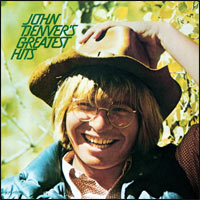 So,
how did such a moderately talented, genuinely nice guy end up on top of the pop
heap? Well, Denver's climb to stardom may have been meteoric, but he paid his dues
well. Born Henry John Deutschendorf in Roswell, New Mexico, the future mountain
man spent his youth as a rootless Air Force brat, and he dove headlong into the
L.A. folk music scene in 1964 after a brief stint at Texas Tech University. It
was there - at the urging of New Christy Minstrel Randy Sparks - that he adopted
the name Denver. Though he was considered for membership in the nascent Byrds,
Denver caught his first big break when he joined a latter-day version of the Chad
Mitchell Trio, singing protest songs for old-school, left-leaning folkies. So,
how did such a moderately talented, genuinely nice guy end up on top of the pop
heap? Well, Denver's climb to stardom may have been meteoric, but he paid his dues
well. Born Henry John Deutschendorf in Roswell, New Mexico, the future mountain
man spent his youth as a rootless Air Force brat, and he dove headlong into the
L.A. folk music scene in 1964 after a brief stint at Texas Tech University. It
was there - at the urging of New Christy Minstrel Randy Sparks - that he adopted
the name Denver. Though he was considered for membership in the nascent Byrds,
Denver caught his first big break when he joined a latter-day version of the Chad
Mitchell Trio, singing protest songs for old-school, left-leaning folkies.
Before the group broke up for good (Denver was Mitchell's replacement, actually),
they recorded one of John's early compositions, "Leaving On A Jet Plane," in
1967. The song was quickly covered by the popular folk trio Peter, Paul & Mary
on their Album
1700, but the single didn't take off till 1969 - just as John Denver was releasing
his solo debut, Rhymes & Reasons.
The fortuitous happenstance helped place Denver in the public eye, but his career
didn't really ignite till "Take Me Home Country Roads" (from Poems,
Prayers, and Promises, his third album) became a smash hit.
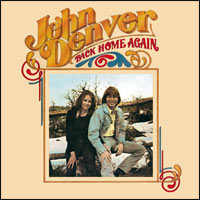 Cowritten
and recorded with Fat City (Bill & Taffy Danoff, later of the Starland Vocal
Band), "Country Roads," with its story of spiritual awakening and reverence
for nature, reflected Denver's newfound lifestyle. John and his family (including
wife Annie, later immortalized in "Annie's Song") had settled in Aspen,
Colorado, in 1970, and the rugged beauty of his surroundings imbued Denver's lyrics
with purpose. Denver's best early songs (such as "Follow Me") had placed
an emphasis on his emotional and interpersonal life (exempting, that is, miscues
like "The Ballad Of Spiro Agnew"). But now, Denver began to espouse a
way of life based simple and wholesome things - harmony with the earth, the love
of family, a sense of community. Cowritten
and recorded with Fat City (Bill & Taffy Danoff, later of the Starland Vocal
Band), "Country Roads," with its story of spiritual awakening and reverence
for nature, reflected Denver's newfound lifestyle. John and his family (including
wife Annie, later immortalized in "Annie's Song") had settled in Aspen,
Colorado, in 1970, and the rugged beauty of his surroundings imbued Denver's lyrics
with purpose. Denver's best early songs (such as "Follow Me") had placed
an emphasis on his emotional and interpersonal life (exempting, that is, miscues
like "The Ballad Of Spiro Agnew"). But now, Denver began to espouse a
way of life based simple and wholesome things - harmony with the earth, the love
of family, a sense of community.
But, judging from the evidence at hand, John Denver was also an ambitious man
altogether willing to stroke the star-making machinery. Under the guidance of powerful
Hollywood agent Jerry Weintraub, the former Mr. Deutschendorf became a true media
star. In addition to scoring five Top 10 albums and seven Top 10 singles - including
seven chart toppers - between 1971 and 1975, Denver was a fixture on magazine covers,
on television (winning an Emmy for An
Evening with John Denver in 1975), and, eventually, in movies (Oh
God, 1977). Ambition is no crime, but by the time John Denver recorded Perhaps
Love (1981) with Placido Domingo - Placido Domingo! - his last shred
of counterculture credibility had all but evaporated.
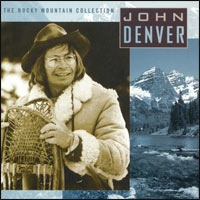 It
was Denver's artistic compliance, however, that proved his real downfall. After "Country
Roads" peaked, the singer failed to garner much airplay with Aerie (1971),
which nevertheless featured several fine songs. After the tree-hugging title track
from Rocky
Mountain High reached the Top 10 in late 1972, Denver's relative slump resumed
throughout much of 1973, during which he released his under-appreciated, western-themed
album Farewell
Andromeda. Following the Christmas release of Greatest
Hits (featuring largely re-recorded versions of early compositions), "Sunshine
On My Shoulders" - originally recorded for Poems,
Prayers, and Promises - became Denver's first #1 hit in January, 1974. The
game was on. It
was Denver's artistic compliance, however, that proved his real downfall. After "Country
Roads" peaked, the singer failed to garner much airplay with Aerie (1971),
which nevertheless featured several fine songs. After the tree-hugging title track
from Rocky
Mountain High reached the Top 10 in late 1972, Denver's relative slump resumed
throughout much of 1973, during which he released his under-appreciated, western-themed
album Farewell
Andromeda. Following the Christmas release of Greatest
Hits (featuring largely re-recorded versions of early compositions), "Sunshine
On My Shoulders" - originally recorded for Poems,
Prayers, and Promises - became Denver's first #1 hit in January, 1974. The
game was on.
Yet another earth-worshipping ballad, "Sunshine" and its success seemed
to flip a switch in John's mop-haired, bespectacled noggin. Like a Pavlovian pop
star, Denver learned what his audience wanted, and he gave them more of it. Thereafter,
Denver's back-to-nature schtick grew ever more blunt. The distance between the
metaphysical yearning of "Rocky Mountain High" and the gratuitous pandering
of "Thank God I'm A Country Boy" is vast, yet Denver made the journey
in just three short years. Pandering has its rewards, though, and Denver made a
mint. Back
Home Again (1974), An
Evening with John Denver (1975), and Windsong (1975)
sold oodles and ruled the charts, collectively generating eight hit singles. Even Rocky
Mountain Christmas (read more)
- released just one month after Windsong -
earned a gold record award!
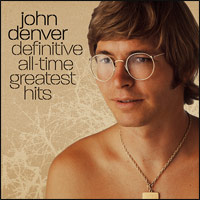 John
Denver had become the anti-Elton, an eager-to-please pop star for people who dreamed
of living the healthy, happy lifestyle he sang about. In reality, however, the
bulk of his devotees worked in dead-end jobs in dingy cities, subsisting on Hamburger
Helper and Happy Days. Feeding their desperate, spiritual hunger must
have been exhausting and, clearly, Denver's music reflected this malaise. With
the teeming throngs clawing for his attention, Denver was "Looking For Space," eager
to "Fly Away." A compilation of old songs, Greatest
Hits Vol. 2 (1977), was his last major hit album, and "My Sweet Lady" -
recorded way back in 1971 - was his last Top 40 hit of the decade when re-released
in 1977. The masses, growing restless, moved on. It was time to get up and boogie
and, later, get pissed and pogo. John
Denver had become the anti-Elton, an eager-to-please pop star for people who dreamed
of living the healthy, happy lifestyle he sang about. In reality, however, the
bulk of his devotees worked in dead-end jobs in dingy cities, subsisting on Hamburger
Helper and Happy Days. Feeding their desperate, spiritual hunger must
have been exhausting and, clearly, Denver's music reflected this malaise. With
the teeming throngs clawing for his attention, Denver was "Looking For Space," eager
to "Fly Away." A compilation of old songs, Greatest
Hits Vol. 2 (1977), was his last major hit album, and "My Sweet Lady" -
recorded way back in 1971 - was his last Top 40 hit of the decade when re-released
in 1977. The masses, growing restless, moved on. It was time to get up and boogie
and, later, get pissed and pogo.
Overwork and overexposure took it's toll on John Denver's music, career, and personal
life. His chart presence was severely curtailed, and he and Annie eventually divorced.
However, before meeting a violent fate in an experimental aircraft crash in 1997
(Denver was an avid flyer), he seemed to reach a happy plateau. He released the
occasional album (often on his own label, Windstar), wrote his autobiography (Take
Me Home, 1994), and devoted himself to environmental and humanitarian causes.
Hearing him commune with his following on later live albums like The
Wildlife Concert (1995) or Christmas
In Concert (1996), one gets the sense of a man comfortable in his own skin
and satisfied with his art. John Denver's legacy - musical and otherwise - continues
to inspire many. As evidenced by singer/songwriters like Alison
Krauss, Ben
Harper, Norah
Jones, and David
Gray, there continues to be an large audience for the sort of music Denver
popularized - just rarely on MTV or Top 40 radio.[top of page]
 Selected John
Denver Albums Selected John
Denver Albums
[top of page]
 Essential John
Denver Songs Essential John
Denver Songs
- Annie's Song (1974)
-
Back Home Again (1974)
-
Calypso (1975)
-
Eagle And The Hawk (1971)
-
Fly Away (with Olivia Newton-John, 1975)
-
Follow Me (1969)
-
For Baby (For Bobbie) (1973)
-
Goodbye Again (1972)
-
I'd Rather Be A Cowboy (Lady's Chains) (1973)
-
I'm Sorry (1975)
-
Leaving On A Jet Plane (1969)
-
Looking For Space (1975)
-
My Sweet Lady (1971)
-
Poems, Prayers, And Promises (1971)
-
Rhymes & Reasons (1969)
-
Rocky Mountain High (1972)
-
Starwood In Aspen (1971)
-
Sunshine On My Shoulders (1971)
-
Sweet Surrender (1974)
-
Take Me Home Country Roads (1971)
-
Thank God I'm A Country Boy (1974)
[top of page]
 The John
Denver Bookshelf The John
Denver Bookshelf
[top of page]
 John
Denver On The Web John
Denver On The Web
[top of page]
 Feedback Feedback
Your witty comments, impertinent questions, helpful suggestions, and angry denials
are altogether encouraged. Submit feedback via email;
submissions will be edited and posted at my discretion.
|
|